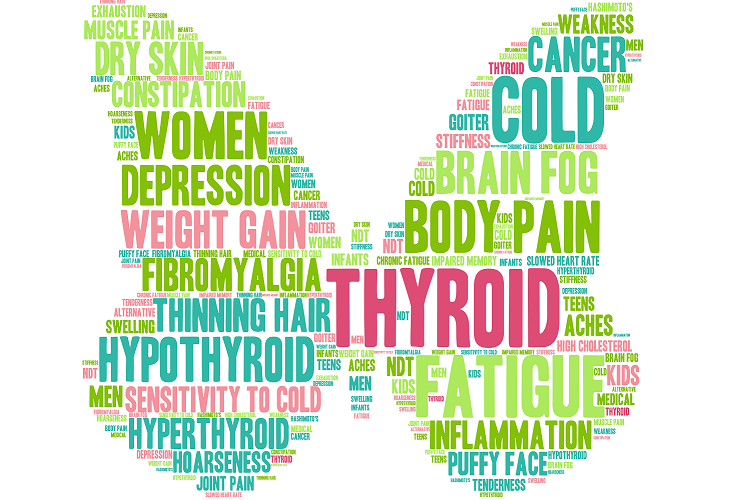Thyroid disease is generally insidious – it generally comes on slowly and can take years before it manifests enough to take action. Left unchecked, it can be serious. Both hypothyroid (low functioning thyroid) and hyperthyroid (over-active thyroid) can cause many problems and should not be ignored.
As with all disorders, proper diagnosis and management is essential. If your doctor is only ordering one or two lab tests, push to have more done. It is important not only to diagnose you properly, but also to find out WHY the thyroid is suffering in the first place. One or two tests only tell you that it is struggling, not why. Many people have most of the symptoms of thyroid disease, but their lab tests show “normal” so the doctor stops there. Many times I have suspected thyroid disease in the absence of thorough testing, and when adequate testing was done, my hunch was right. Tests like TPO or TAA to look for thyroid antibodies to reveal an autoimmune process going on, Free T3 and Free T4, T3 & T4 Serum, etc. TSH, the most commonly used test today, just isn’t enough.
There can be many culprits responsible for a malfunctioning thyroid. The pituitary, liver, parathyroid, adrenals and hypothalamus can be involved. Healthy functioning of all these endocrine glands is critical to healthy thyroid function. Who’s not doing their job?
Beyond that, we look for other culprits. Over-exposure to radiation without a thyroid guard is suspect in autoimmune thyroid disorders. Be careful when getting x-rays, especially repeatedly, of the neck, mouth (dental) and chest. Ask for a thyroid guard to protect your thyroid. Certain dietary factors can precipitate thyroid issues. According to Dr. Raphael Kellman, an integrative and functional medicine doctor and author of The Microbiome Diet, gluten appears to have a direct correlation to Hashimoto’s Thyroiditis. He is also concerned about the effect of soy and peanuts on the thyroid.
It is important to look at dietary deficiencies as well. The most well-known contributors to thyroid disease is a deficiency in zinc, selenium, iodine, iron, inositol, tyrosine (an amino acid), Vitamin B12 and Vitamin D. This is just the beginning.
Once the causative factors (generally there is more than one) are figured out, we can put in the corrections. Dietary supplements, good wholesome dietary food choices and herbs can be helpful. There are times that thyroid medications are necessary, and never stop your thyroid medication without professional guidance. However, much can be done to support the thyroid and prevent further deterioration.
Acupuncture has been shown to have a positive impact on thyroid disease in several studies. In one study, done by the School of Chinese Medicine of Hong Kong Baptist University found that “Chinese medicine is effective in improving the symptoms of patients with hyperthyroidism and enhancing their quality of life in general”. It also regulated the immune system and had an overall efficacy rate of 88.7%. The British Acupuncture Council in a 2018 overview of research found that acupuncture increased levels of thyroid hormones in people with hypothyroidism, and lowered levels of thyroid hormones in patients with hyperthyroidism. If your thyroid is not happy, do not despair. There is hope.
©2019 Holly A. Carling, O.M.D., L.Ac., Ph.D.







